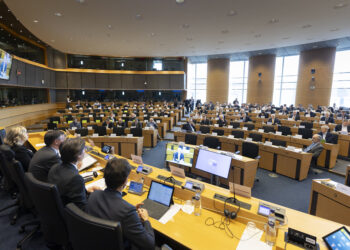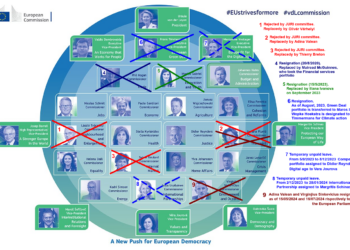European countries are, fortunately for us, all democratic countries. Oh my, there is “illiberal democracy” in some, but from the point of view of elections, they are held regularly and almost always without contestation of the freedom to vote.
Polls opened these days for the European elections for the tenth legislature. In almost all countries, there is no obligation to go to the polls, and even where there is, as here in Belgium, there are no significant consequences for those who abstain. They told me that compulsory voting, at least in this realm, was introduced to defend the workers as their employers used to put up obstacles to prevent them from going to the polls because they would have voted to the left. So, the exercise became compulsory so that the impediments would fall.
Voting is an exercise of freedom.
Not voting is as well, of course. But, in my opinion, there are many problems with not voting. One is that those who choose to stay home end up in an indecipherable cauldron of the uncaring, the disappointed, the angry, the unsuspecting, the committed…. Not voting sends no political signal because there is no readable message in not voting since the phenomenon encompasses too many different categories. I know people who, as I mentioned, don’t vote because they don’t care; others who would like to but think the parties are all corrupt and “I don’t want to play their game.” Other people, friends whom I hold in high esteem, announce that they will not vote because they are very politicized instead, and they are deeply disappointed in the management of the European Union. Some people cannot find a party that convinces them. It happened to me, too, in 2019 with the Italian parties. Fortunately, thanks to European democracy, as a resident of Belgium, I had the right to vote for lists from this country, among which there was one that convinced me, even with a particular candidate I trusted. So I voted with conviction (for the record, the party did very well, and my candidate did too, and he played a leading role in the legislature that had just ended).
Not voting, in the particular sense of not going to the polls at all, by the way, does raise doubts for the parties that win votes in elections. Even when abstentionism is very high, let’s say close to 50 percent, one coalition or another gets a majority to govern, and it feels entitled to do so even if it secured 25 to 30 percent of the votes, as if it had the consent of more than 50 percent of the citizens. And it does govern: it changes laws and constitutions, interpreting the momentary advantage as the power to represent all or, at any rate, the vast majority of the country.
Politics goes on anyway, it doesn’t fret about what it represents, it only counts the seats in its Parliament.
In a private conversation this morning, a colleague said a very beautiful phrase about the essence of democracy: “With a vote, you can choose a person committed and whom you can hold accountable. It is little, but it might as well not be there.” There it is: it explains how, out of respect and to defend democracy, you have to exercise its powers. Of course, one can be disappointed with some or all of the Union’s policies, but certainly among the candidates, as my colleague recalled, “someone is there who says so; maybe he will struggle to be elected, but someone is there.”
And then the fact of the matter is that if you don’t go and vote, as one of the slogans of the European campaign to support participation says, someone else will go and vote and decide for you as well, and therefore, “you will not be impervious to this thing.”
Therefore, refusing to go to the ballot does not weigh on the choices the governing parties will make. It simply discredits democracy, weakens it at what could be its highest moment, even legitimizing those who think that, after all, people do not care to participate and, therefore, one can either do without this exercise or weaken its effects and its value. And so, perhaps five or ten years from now, when those who do not vote today choose to do so, they will find that, at that point, their vote means nothing, even if their chosen party wins and governs.
English version by the Translation Service of Withub









![Una donna controlla le informazioni sul cibo specificate sulla confezione [foto: archivio]](https://www.eunews.it/wp-content/uploads/2014/12/Etichette-alimentari.jpg)

